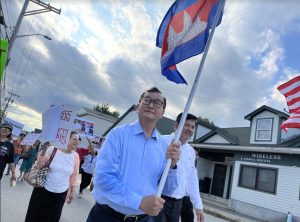A French court has ruled in favor of Cambodia’s long-time opposition leader Sam Rainsy in a defamation case filed by the country’s Prime Minister Hun Sen.
Hun Sen brought the case in response to Sam Rainsy’s claims, made on Facebook in 2019, that he was behind the deaths of Cambodian trade union leader Chea Vichea in 2004 and former police chief Hok Lundy in 2008. Hun Sen said in Phnom Penh on October 11 that he won’t appeal the French court’s verdict.
The claims made by Sam Rainsy were indeed defamatory but were made in good faith, the court wrote in its judgment. His accusations that Hun Sen was behind the deaths of Chea Vichea and Hok Lundy are “part of a major general-interest debate over respect for human rights and fundamental freedoms in Cambodia,” the judgment states. The court noted that Sam Rainsy has been in forced exile in Paris since 2015, that his opposition Cambodian National Rescue Party was dissolved by Cambodia’s supreme court in 2017, and that it is impossible for him to travel to Cambodia to carry out further investigations.
The decision is “much more than a personal victory,” Sam Rainsy’s lawyer Mathias Chichportich wrote in a statement. The French justice system has “solemnly confirmed the legitimacy of his actions and defended his freedom of expression.”
Chea Vichea, who had worked with Sam Rainsy to establish Cambodia’s first trade union, was shot dead in broad daylight at a newsstand in Phnom Penh on January 22, 2004. The court accepted reports from Amnesty International on the context of political violence and extrajudicial killings in which the assassination took place. The two people initially convicted of the killing were later acquitted in Cambodia, and the French court stated that no serious investigation has ever taken place.
Sam Rainsy’s accusation that Hun Sen was responsible was supported by the analysis of non-government and international organizations, independent journalists, and a witness involved in the official investigation, the judgment noted. A local police chief considered that the killing had been organized by Hok Lundy on Hun Sen’s behalf. Sam Rainsy could therefore “reasonably formulate the conviction” that Hun Sen was responsible, the court found.
Sam Rainsy claimed that Hok Lundy had to be killed because he was preparing to reveal the order he had received from Hun Sen to kill Chea Vichea. The court noted that a variety of official reasons have been given for why Hok Lundy was on board a helicopter flight from Phnom Penh to Svay Rieng on November 9, 2008, and why the helicopter crashed. Official descriptions of the state of his body on recovery are also inconsistent, it noted.
These contradictions are not enough to establish that Hun Sen was involved, or even that there was a criminal reason for Hok Lundy’s death, the court said. But such discrepancies made it “legitimate” for Sam Rainsy to seek to establish the real causes, the judgment states. No serious legal or technical investigation into the crash has ever been carried out, indicating a “will to dissimulate” on the part of the Cambodian government, it adds.
The court said it had to balance the criteria of defamation against the danger of restricting freedom of expression. There are higher thresholds for restricting people who are involved in the events on which they comment in comparison with, for example, journalists who have a duty to inform, it said.
A second defamation case against Sam Rainsy filed by deputy police chief Dy Vichea, Hun Sen’s son-in-law and the son of Hok Lundy, was also dismissed. The court found that no defamation of Dy Vichea had been shown.
The French courts will continue to be used as a venue for the decades-long confrontation between Hun Sen and Sam Rainsy, which shows no signs of resuming in Cambodia. At the end of December 2021, a French court issued indictments against two Cambodian generals, Huy Piseth and Hing Bun Heang, for ordering and carrying out a grenade attack on a protest march being led by Sam Rainsy in Phnom Penh in March 1997. The order was made in response to a case filed by Sam Rainsy, who has dual French and Cambodian citizenship, and will lead to a trial being held at the Paris Cour d’Assises.
The attack killed 16 people and left about 150 injured, including Chea Vichea. Sam Rainsy, the target of the attack, survived unhurt though his bodyguard was killed. Huy Piseth at the time was the chief of Hun Sen’s bodyguard unit and Hing Bun Heang was the deputy chief. The French court also issued a summons for Hun Sen for his role, which was blocked by the French government on grounds of Hun Sen’s head of state immunity.

































